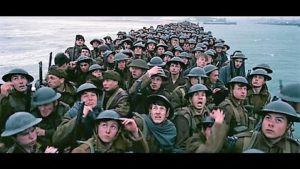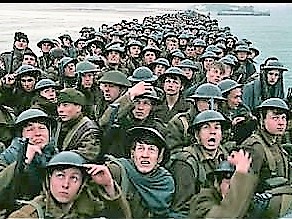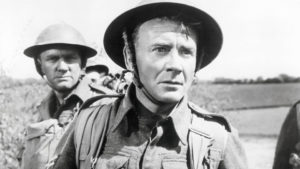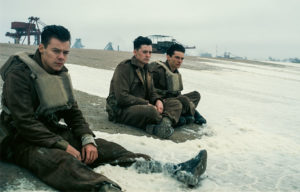Dunkirk ** (2017, Fionn Whitehead, Aneurin Barnard, Mark Rylance, Tom Glynn-Carney, Tom Hardy, Kenneth Branagh, James D’Arcy, Cillian Murphy, Harry Styles) – Movie Review
Writer-director Christopher Nolan retells the World War Two Dunkirk story at this weird and unhappy point in Britain’s history with Europe. Why? It’s a mystery. He’s never dabbled in history before, and he provides no clues why he needs to now.
It is the grim and distressing story of the evacuation of Allied soldiers from the beaches and harbour of Dunkirk, France, between 26 May and 4 June 1940. They were cut off and surrounded by the German army and constantly under fire by Nazi planes.
Nolan isn’t one for explanations. He provides minimal dialogue and minimal characterisation, leaving the space free for visual pyrotechnics. The film looks good, sometimes great even, but then it should, it has had $150,000,000 spent on it.
This wartime drama is no action thriller. It is neither exciting nor suspense filled, of course. It can’t be because it is the gruesome and harrowing story of men in terrible distress, pain and the throws of death desperately waiting some kind of rescue attempt. It is a desperately sad and tragic movie, a total downer.
[Spoiler alert] As everybody knows, I guess, hundreds of little boats arrived over from England to pick up the lads in appalling danger and distress. Many, many lives were thus saved, in a great escape, but most of the film is a story, or stories, of horror and defeat in war. It is hard to watch. It is like watching a horrific road accident. You want to turn away. Of course Saving Private Ryan was like this too. War movies are probably very much a matter of taste. Some people might prefer not to put themselves through all this. Unless there is an obvious purpose. But what is it, Mr Nolan?
When the boats turn up heroically, and under Nazi fire, there should be a huge surge of emotion. But Nolan manages to make this very muted. The emotion he stirs is all about the suffering and the pity that must be afforded to everyone involved.
Mark Rylance and Tom Glynn-Carney give the nearest things to performances in the film in their little mini-drama of Mr Dawson and Peter, a father and grown-up son setting off in a small boat to the rescue. Their little mini-drama is the nearest things to an involving human drama in the movie. We should have stuck with this story, seen it all through the eyes of Mr Dawson and Peter.
[Spoiler alert] They head off bravely to France with an eager-beaver 17-year-old boy to help – George (Barry Keoghan). They rescue the shell-shocked Cillian Murphy, who promptly gets stroppy because Mr Dawson won’t head back to England, (‘he’s not himself, he may never be,’ says dad) and promptly shoves George down stairs. This storyline is as melodramatic as it is unbelievable.
Luckily, Mr Dawson and Peter are made of strong, sterling stuff and head off to the French beaches regardless. Thus the British stiff upper lip, sense of fair play and courage and grace in defeat are being celebrated.
Meanwhile, Nolan gets on with explosions and killings and plane fire on a grand scale. It is impressive, incredibly impressive, but what it is all for? Why doesn’t Nolan shove in some audible dialogue and tell us something about his characters and more about what is going on and why.
Yes, that would make it a much longer film, but a much better one. Dunkirk seems thin, almost emaciated, at an hour and three quarters, just when you are expecting a three-hour epic. That is the film that would do justice to this subject, though it wouldn’t probably be any easier to sit through.
Some audible dialogue – yes! The actors are mumbling and muttering away, er naturalistically, but we can’t make out most of what they are saying. Of course that’s OK because the dialogue is inconsequential. Dunkirk plays like a silent movie set to an orchestral soundtrack with added sound effects. No wonder Nolan investigated silent films for inspiration with his crowd scenes.
Talking of the orchestral soundtrack, the film is drowned in a horrible, discordant score by Hans Zimmer. The first rescue of Dunkirk should be to ditch the whole score in its entirety and run the film with natural sound only. Isn’t Nolan after authenticity? Well that’s how he’d start to get it.
It is hugely disappointing that the film’s well-known name stars Tom Hardy, Kenneth Branagh, James D’Arcy, and Cillian Murphy have nothing to do as the fighter pilot Farrier, Commander Bolton, Colonel Winnant and ‘Shivering Soldier’. Hardy’s and Murphy’s roles are particularly disappointing, mere cyphers. Branagh spouts a few common place remarks and looks pained all the time. It is what he’s asked to do. But he needs dialogue and some meat on his bones. Nolan’s screenplay is in need of an overhaul. I should point out that Harry Styles is in the movie, too, but it looks like a canny move to put some star power and youth appeal into a movie that doesn’t have much.
Maybe the film is simply a sincere anti-war movie. If so, it does work like that. You leave the cinema glad to be out of it, glad to be alive, and glad never to have been in battle or around at the time of Dunkirk. The other main thing in its favour is that it is a totally British viewpoint. There are no Americans as a concession to the box office, and, incidentally, no roles for villains either. In this way, it feels like a personal vision, and not a committee-led blockbuster.
There is a good old movie on the subject, also called Dunkirk (1958) oddly enough. It stars John Mills and Richard Attenborough, and is directed by Barry Norman’s father, Leslie Norman.
© Derek Winnert 2017 Movie Review
Check out more reviews on http://derekwinnert.com







